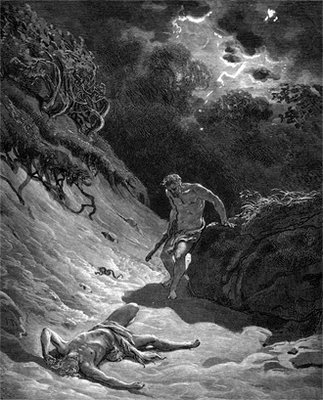Tuesday, June 27, 2006
From Stealing Fruit to Killing Brothers (Genesis 4)

The story of Cain and Abel: the first brothers and the first murder. Abel is a sheepherder and Cain is a farmer. Both are good honest professions as far as I can see. Perhaps there is a bit of a shadow on working the ground from the curse, while supervising the animals was Adam’s first divinely appointed task. At any rate, God likes Abel’s offering and shuns Cain’s.
Cain is understandably upset, and God, with a surprising act of tenderness, gives some fatherly advice: “If you do well, will you not be accepted? And if you do not do well, sin is crouching at the door. Its desire is for you, but you must rule over it.” Very well. Now that man has the knowledge of good and evil, he must rise to the task and “do well.” God warns him that this isn’t easy – there will be a struggle with sin that he must master.
Cain doesn’t do so well, and Abel’s blood seeps into the already cursed ground. In a stroke of poetic justice, the ground will never produce a thing for Cain now (you thought thorns and thistles were bad) and he is exiled from his livelihood. Cain’s story is like Adam’s – the same pattern of disobedience, curse, and exile – only the stakes are higher and the consequences more severe. Yet God spares his life, as he did with Adam, both of which seem strange to me.
Then comes Lamech, Cain’s great great great grandson, who kills a man and evokes God’s protection from any reprisals. Things seem to be getting worse and worse throughout the generations, ‘til we finally arrive at God’s assessment that the “wickedness of man was great in the earth, and that every intention of the thoughts of his heart was only evil continually.”
Despite knowing good and evil, man isn’t doing very well.
Comments:
<< Home
Has it ever really bugged you that Cain's sacrifice was not accepted? At this point in the game, there aren't all those nice formulaic laws that we get later for sacrifice, so he's not breaking any rules by offering the fruit of the ground. Daniel Quinn gives a humanistic explaination of the myth by saying there's something naturally evil about breaking the laws of nature by taking ownership of the ground, but you're obviously not in his boat. So why is God so hard on Cain's sacrifice? I had always heard an explaination that he wasn't offering hte best like Abel was, but I hesitate from that answer because A) that's not really in the text and B) God hasn't asked for any sacrifices at all at this point, the best or otherwise. Any insight?
I think I gave the best explanation I can surmise from just looking at the text: Cain's offering was taken from the ground, which has just been cursed by God. Abel, on the other hand, offers God a spotless lamb. With our christological eyes, we see Abel's offering foreshadowing Christ.
Daniel Quinn is a moron, by the way. You can tell him I said that... ;-)
Daniel Quinn is a moron, by the way. You can tell him I said that... ;-)
Adam and Eve saw what was needed to cover sin-the death of an animal. God may have told them then that they were to offer an animal to atone for sin. Cain seems to me the very "modern man," who attempts to approach God on his own terms, instead of through the Blood of the Lamb.
Hi Thulcandran Revolt,
I have some thoughts on sacrifice here and here. I do think its a bit of a stretch, however, to see the skins and Cain and Abel's sacrifice as a sin offering. The skins seem like God providing for them, and the sacrifices seem more like gifts than any sort of atonement for anything. I think this is a bit difficult to argue from the text itself.
Post a Comment
I have some thoughts on sacrifice here and here. I do think its a bit of a stretch, however, to see the skins and Cain and Abel's sacrifice as a sin offering. The skins seem like God providing for them, and the sacrifices seem more like gifts than any sort of atonement for anything. I think this is a bit difficult to argue from the text itself.
<< Home
Home
Who is Oyarsa?
Contact Me
Blog the Bible
Recent Comments
Archives
- June 2006
- July 2006
- August 2006
- September 2006
- October 2006
- November 2006
- December 2006
- January 2007
- February 2007
- March 2007
- April 2007
- May 2007
- June 2007
- July 2007
- August 2007
- September 2007
- October 2007
- November 2007
- December 2007
- January 2008
- February 2008
- March 2008
- April 2008
- May 2008
- June 2008
- July 2008
- September 2008
- October 2008
- November 2008
- July 2009
- August 2009
- January 2010
- August 2010
Recommended Books

